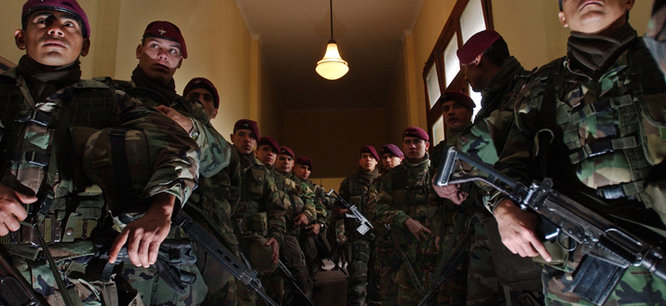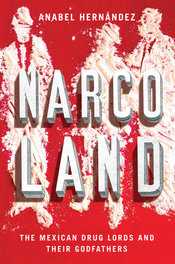What Happened to Mexico? An Interview with Anabel Hernández
What Happened to Mexico? An Interview with Anabel Hernández
Over the last decade, as many as 100,000 Mexicans have been killed in drug-related violence. The fighting is sustained by consumer demand for drugs and guns from the United States, but for most Americans the contours of the conflict remain obscure. A leading Mexican investigative journalist talks about her newly-translated book, Narcoland.

Over the last decade, as many as 100,000 Mexicans have been killed in drug-related violence. The fighting is sustained by guns and consumer demand for drugs from the United States, but for most Americans the contours of the conflict remain obscure. Thanks to a translation from Verso Books, English speakers can now read one of Mexico’s best-selling accounts of the drug war: Anabel Hernández’s Narcoland: The Mexican Drug Lords and Their Godfathers (originally published as Los Señores del Narco in 2010). Hernández argues that the power of the cartels cannot be understood without examining their links to big business and senior politicians; her conclusions have brought her controversy and death threats. I spoke with Hernández on the U.S. leg of her book tour about her investigations and their implications.
Dissent: Narcoland is the first of your books that’s been translated into English, but you’ve written several others in Spanish. Can you tell me a little about that earlier work and how you came to write Narcoland?
 Anabel Hernández: I am an investigative reporter, and I had previously investigated corruption and abuses of power. I didn’t start researching the drug war until 2005. Many people don’t remember that Mexico at this moment was very violent. Nine thousand people were murdered in drug-related violence during the Vicente Fox government (2000–2006). The war between the cartels didn’t start with the government of Felipe Calderón (2006–2012). It started in 2003, when the Sinaloa Cartel tried to take control of Nuevo Laredo, a city controlled by the Gulf Cartel. By 2005 Mexico was very violent, and I wanted to find out why. What happened?
Anabel Hernández: I am an investigative reporter, and I had previously investigated corruption and abuses of power. I didn’t start researching the drug war until 2005. Many people don’t remember that Mexico at this moment was very violent. Nine thousand people were murdered in drug-related violence during the Vicente Fox government (2000–2006). The war between the cartels didn’t start with the government of Felipe Calderón (2006–2012). It started in 2003, when the Sinaloa Cartel tried to take control of Nuevo Laredo, a city controlled by the Gulf Cartel. By 2005 Mexico was very violent, and I wanted to find out why. What happened?
Dissent: Five years later, in 2010, your book was published in Mexico. What was the conversation about the drug war like then in Mexico, and what did you hope to change with the publication of your book?
AH: Before the book, the official story was that the federal government was fighting against the drug cartels, that the government wanted to destroy them and make Mexico more peaceful. But that is not true. After my book was published, people started to understand the lies of the federal government. They started to understand that many officials of Calderón’s government were involved with the drug cartels—in particular, that they protected the Sinaloa Cartel and used the power of the state against its enemies. So when my book was published many of the lies of the government came down. Nobody’s in jail, because in Mexico there’s too much impunity. But now the people know the truth, and I’m sure that the violence and the corruption is one of the reasons that Calderón’s party lost the last election [in 2012].
Dissent: The winner of that last election, Enrique Peña Nieto, makes a small appearance in your book as the governor of the State of Mexico. He’s now the president. Though it’s very early in his term, do you have a sense of his policy on the cartels? Will it be a continuation of the last twelve years or something different?
AH: As you say, and I believe, it’s too early to tell. But I see some signs that worry me. First, the violence is still there. Between January and July of this year, 10,000 people have been killed in the conflict between the cartels. Second, Calderón left Peña Nieto very weak institutions, many of which have been penetrated by the cartels. Peña Nieto hasn’t cleaned up those institutions; the people who work for the cartels are still there. How can you really do something different with the same bad people? Third, Peña Nieto has been talking about his strategy since January. “Oh yes, I have a strategy…” But nobody in Mexico knows what his strategy is. I’m really afraid that the Mexican government doesn’t want to do anything to change things, or that the government doesn’t even know how to change things.
Dissent: Because they have never held presidential power, the political left is largely absent from your book. Is the center-left PRD just as compromised as the PAN, the center-right party which produced Fox and Calderón, and the PRI, the historical ruling party to which Peña Nieto belongs? What would have happened if the PRD candidate, Andres Manuel López Obrador, had won in 2006 or 2012?
AH: What I found in my book, and in more recent investigations, is that all the parties have been penetrated by the drug cartels. Many of the congresspeople from all parties—PAN, PRI, PRD—had their campaigns paid for by the cartels. It’s hard to say what would have happened if López Obrador had won the elections. His party was part of the corruption, but as of 2012 he is no longer part of the PRD. He is independent and I don’t know what will happen with his new organization in regards to the drug cartels.
Dissent: With all the parties so compromised, where can change come from? You talk a little in your book about the protest movement led by the poet Javier Sicilia. Does hope now rest with this kind of movement in civil society?
AH: The system in Mexico will not change by itself. Each part of that system is involved in the corruption, so everyone protects everyone else. I really believe that the only way that things can change is the movement of society. Society has to push the government to be a government. Society has to push the parties to work for society and not for themselves. That is the only option. The international community has to support that kind of organization.
Dissent: Speaking of international issues, your book traces U.S. involvement in the Mexican drug trade back to the Iran-Contra affair. Can you talk a little bit about the role of the United States since the 1980s?
AH: I found that the CIA was involved with the cartel of Pablo Escobar Gaviria, helping to connect it with the drug organizations in Mexico. That connection changed the geography of the drug cartels in Mexico forever. With the power of the money from cocaine, they were able to dictate terms to the Mexican government and start to bribe officials. This information is publicly available in the Kerry Committee report [which details links between narcotics traffckers, U.S. intelligence, and the Nicaraguan Contras in the 1980s]. I always wonder, “That happened once. It’s possible that it happened other times.” I don’t know, but that’s my question.
Dissent: Is there a message you want to convey to British and U.S. audiences with the translation of your book and your visits to those countries?
AH: It’s important to me that that the book has been translated into English, because now those who consume illegal drugs can know what their money is doing to Mexicans. A person buys a gram of cocaine or marijuana on a street corner in New York or London or Paris or wherever; with that money they are helping the drug cartels buy guns, bribe officials, and kill people. The problem I talk about in Narcoland is not a Mexican problem, it’s a problem for the whole world. When any country opens the door to illegal drugs from Mexico, they open the door to the cartels, and they come inside. I don’t know why other countries don’t understand this. When you have drugs on the corner, you have these guys there too, and they are very dangerous. They are criminals, and they don’t just control drugs, they also control prostitution, child pornography, piracy, and many terrible criminal activities. I have heard many times, “It’s my body, it’s my life, it’s my problem.” But it can also be the body of your son, if he is kidnapped. It can be the problem of your sister, if she is trafficked. It’s everybody’s problem.
Dissent: The book has just been translated into English, but it’s been three years since it was published in Spanish. What have you been up to since then?
AH: When I published this book in 2010, my life changed forever, in a good way and a bad way. The bad way is that I receive death threats. But the good way is that many people want to share information with me. Now I have more informants, more documents, more proof of the involvement of the federal and local government with the drug cartels. I can’t stop, even if I wanted to. People believe in my work, and trust me, and I have too much information. I’m still publishing and I’m working on a new book about all of this.
(This interview has been edited for clarity.)
Tim Barker is Dissent‘s online editor.




